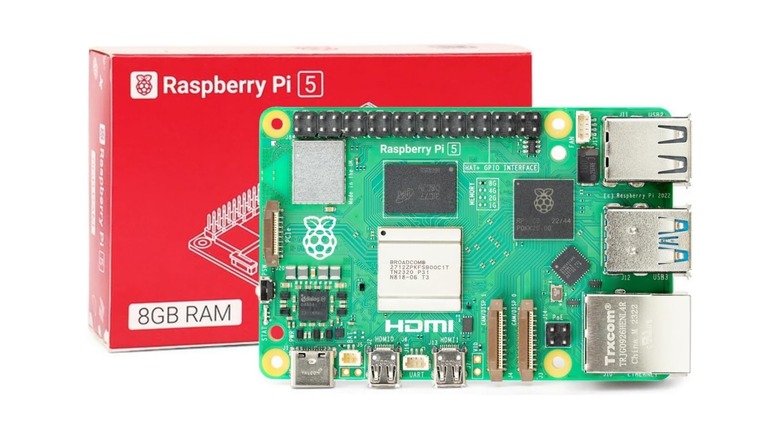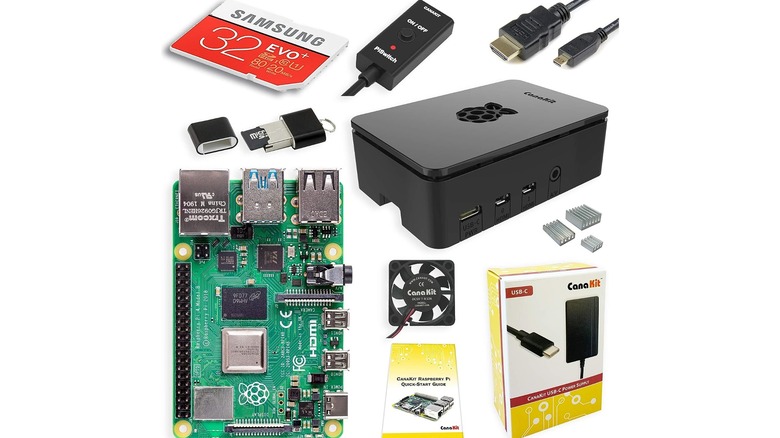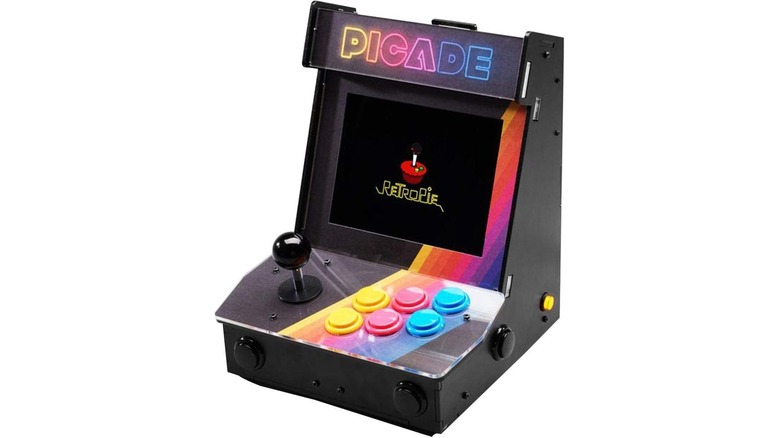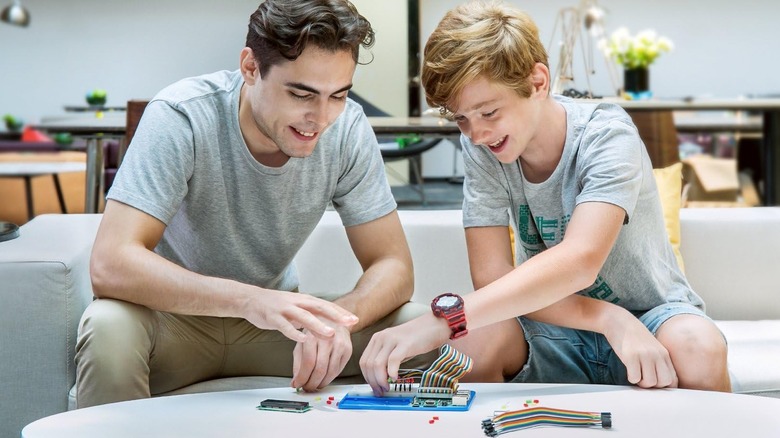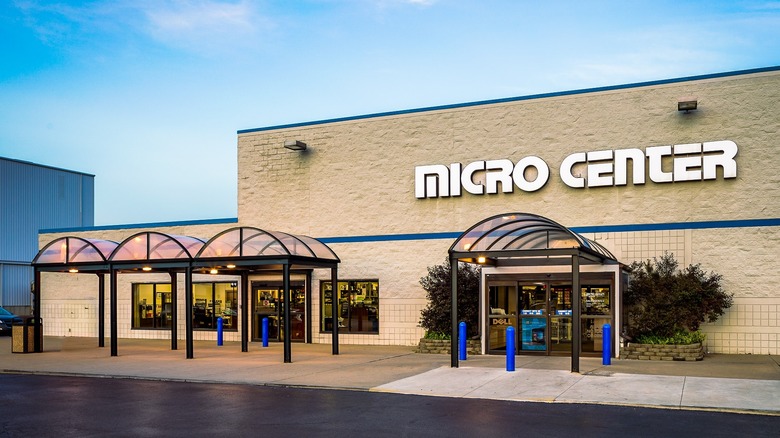Raspberry Pi Kits For Beginners: What Might Be Included & Where Can You Buy Them?
We may receive a commission on purchases made from links.
Since its launch in 2012, the Raspberry Pi single-board computer (SBC) has taken the tech world by storm with its various models. Priced to move while packing a surprising amount of computing power, the Pi was created with the ethos that the project was intended to "democratize" computing. "We believe that every young person — whatever their background or access to resources — should have the opportunity to learn how to create with digital technologies," reads part of the values section of the company's "Strategy 2025" document. "We have an enduring commitment to providing low-cost, general purpose computers for education through Raspberry Pi Ltd."
Having said that, we're still talking about bare boards. No matter what you intend to do with a Raspberry Pi, you will most likely want to spruce it up with a starter kit that was either bundled with the board or sold separately as a purpose-built kit. Some are designed to supply everything you need for basic functionality in an attractive package, like a case/cooler combo along with the necessary power supply. Other kits are for very specific use cases, like handheld gaming consoles, security systems, or music streaming. Finally, there are kits that truly embody the intended ethos of the Raspberry Pi, which are designed to introduce STEM-inclined kids to computer programming. Let's look at these different kinds of kits in more detail and go over where you can find them.
Basic starter kits
The most obvious Raspberry Pi starter kit is the most basic kind, one that comes with the bare necessities that you need to use the SBC that you're normally expected to cobble together yourself. These tend to include a case (often with fan, especially for the Raspberry Pi 5), USB power supply, microSD card, and a Micro HDMI to regular HDMI cable. These are the most common starter kits and the types that most Pi users are likely to try at first. If you're using a Raspberry Pi for things that other kinds of computers could handle, these should be more than fine.
The case should be pretty self-explanatory, but depending on which one you get, it could make I/O more accessible by giving you multiple USB ports. As fans become more commonplace to keep the CPU and GPU cool under heavy loads — like emulating PlayStation 2 games — those also tend to be integrated into the cases. The microSD card is a must so you can get software running on the Pi, of course, as is the power supply, but that's something that you could conceivably have laying around your home already. (The same could also be said for a smaller or older microSD card that might be perfect for the Pi.) Some kit makers also include a matching mouse and keyboard, in some cases bundling the official Raspberry Pi models that come in color schemes matching the official case.
Project-specific kits
In addition to the kinds of Raspberry Pi kits that help you better execute any kind of general computing project, there are various mass-produced kits purpose-built for specific projects. Some are bundled with the necessary Raspberry Pi board itself, while others aren't, but they're all designed specifically with the Raspberry Pi in mind.
If you're intending to use a Raspberry Pi for a classic gaming project running a purpose-built operating system like RetroPie or Batocera, you could put it in a basic case and hook it up to your TV. Alternatively, you could buy a specialized kit that lets you play the games in a handheld or tabletop console. These all have fully-finished casings and built-in displays, speakers, etc., and just need the guts provided by the Pi. For tabletop mini arcade cabinets, options include the Picade and other, lesser-known options from companies like Vilros. You could also go for a Game Boy-styled handheld and pick up something like the RetroFlag GPi, which just needs a Raspberry Pi Zero to function. (Even the $10 to $15 Pi Zero can emulate whatever older 2D games you throw at it.)
This just scratches the surface. You can get a camera kit for setting up a Raspberry Pi-based security system and potentially grab a more robust kit to also stream audio. There are kits to turn the Pi into the heart of a hi-fi digital music playback system, too, among many, many other options.
STEM kits for kids
Another category of Raspberry Pi kits are those that can be best described, at least in broad terms, as STEM kits. Generally speaking, these are kits that include parts and instructions for beginners — usually children — learning how to program simple projects on a Raspberry Pi, often encouraging them to use a specific programming language like Python. The simplest ones include very basic and inexpensive components for the simplest projects to help kids get acclimated to both programming a Raspberry Pi and connecting different parts to it. They can also get more complicated, though, to the point of robotics kits for kids that teach them how to program their own robots using a Raspberry Pi and the parts that come with the kit.
If you're a parent with a child interested in STEM, then kits like these are great starting points. They're much more advanced than the science experiment kits of decades past, all while teaching kids actual, potentially marketable programming skills. If anything, it's this kind of application, along with general low-cost computing solutions, that the Raspberry Pi was originally designed for. They also tend to be made with safety in mind, not requiring use of tools that a parent might want to keep kids away from, like soldering irons. So if the idea of a bare board intimidates you at first, don't let it, because there are plenty of ways to use it that won't require specialized tools.
Where can I buy Raspberry Pi kits?
To find Raspberry Pi boards and the various kits, it's best to start with Raspberry Pi's approved resellers. The official Pi website has a full list of "approved resellers" across the globe, but you're going to get better results clicking the "buy now" button on any item page there, which will then take you to the official reseller list for your home country for home, industry, and education use. In the United States, there are several official resellers, with SparkFun being the only one that handles sales to all three of the aforementioned sectors.
If you're looking for an in-person shopping experience, then your best bet is Micro Center, the computer superstore with 29 locations spread across 19 states. Both Micro Center's mail order arm and its retail stores carry Raspberry Pi products as an approved reseller. Its stores have department-specific salespeople, and you should be able to get questions answered in-store if needed. Alternatively, it's also the best retail option for PC components and learning how to do your own custom build. It's also great if you want to teach someone computing.
As with most products, Amazon is also an option, though it's not clear if any of the approved resellers have storefronts there. Having said that, the approved reseller listings linked above don't say anything about warranty support.
